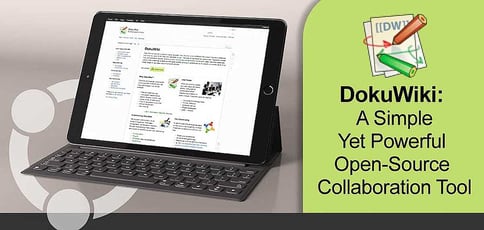
TL; DR: Created with the power of simplicity in mind, DokuWiki has become a popular open-source software solution for individuals and enterprises alike. The PHP-based platform, which notably does not require a database, is both low-maintenance and versatile. With customization options through a variety of plugins and the support of an energized open-source community, DokuWiki is empowering users to create and collaboratively edit content — for free.
Like “ukulele” and “lanai,” “wiki” is a loanword: used in the English language but stolen from another — in this case, Hawaiian.
In 1994, Ward Cunningham took a trip to Honolulu, where he rode the Wiki Wiki Shuttle upon arriving at the local airport. The word, meaning “quick” in Hawaiian, inspired him to name his new web platform “WikiWikiWeb.”
The term “wiki” soon became ubiquitous, describing a website that allows users to publish and modify content through a web browser. Today, wikis come in many flavors, developed in various programming languages with licenses ranging from open-source to proprietary.
DokuWiki, for example, is an open-source, PHP-based platform that doesn’t require a database, making it easy to use with low system requirements.

Founder Andreas Gohr created DokuWiki for personal use, but it has now garnered the support of an active community.
DokuWiki’s tagline, “It’s better when it’s simple,” says it all — the software is easy to install, use, and maintain.
But simple doesn’t mean limited. DokuWiki is popular with individuals, small teams, and enterprises alike, featuring built-in access controls and a variety of free plugins that extend features for a range of use cases. With a backward-compatible system and an active community willing to answer questions and share its experiences, DokuWiki is a simple but powerful tool enabling users to create and collaboratively edit pages at no cost.
A Versatile, Low-Maintenance Wiki That Doesn’t Require a Database
Founder Andreas Gohr created the software as a way to document his work as a sysadmin. “I needed something that wouldn’t require a database, and I wanted to be able to access my documentation, even if I had to pull it off a tape backup,” he said. “There were a few open-source wikis already available, most notably MediaWiki, but they all required a database.”
Andreas initially toyed with a system based on the AWK programming language and shell scripting before deciding to go with PHP. “I finally decided to write my own system in PHP, and the first rough prototype was done in a weekend,” he said.

Keeping it simple: DokuWiki was built with both functionality and usability in mind.
Features like page history, multi-user support, and access control lists came later. When he initially developed DokuWiki, Andreas told us his overarching goal was to create something simple to install and use.
“This means the core install should run on any standard web host without the need for anything special,” he said. “If it has PHP, DokuWiki will run on it; the no-database-needed feature plays well into that.”
Upon installation, the software contains all standard wiki features as well as sensible default settings. Andreas said it takes just half an hour for most users to get up and running. “It’s much easier and faster to get started with a DokuWiki than with many of the other wiki solutions out there,” he said.
To prove it, Andreas recommends you try out the software for yourself — after all, it’s free, quick, and easy-to-use.
Focused on Backward Compatibility and a Trend-Resistant Approach
Wikis have become increasingly popular over the last decade. They’re used to communicate, share knowledge and data, and enhance collaboration with little to no associated costs. “The wiki concept has proven itself to be a very efficient mechanism for collaborative information collection, and DokuWiki is an excellent implementation of that,” Andreas said.
Founded in 2004, DokuWiki has also been a tried-and-true representation of that concept. In the 14 years since Andreas launched the software, he’s observed more than a few wiki engines and wiki-based companies come and go.
“Today, very few of these engines and companies are still around — but DokuWiki still exists, because its goal was never to follow trends, but to solve a problem and solve it well, no matter if wikis were hip or not,” Andreas said.
The mission behind DokuWiki is to provide a quality platform optimized for performance. Rather than chasing trends, Andreas keeps his eye on the shifting PHP landscape. “With PHP7, the language got a lot more modern and fast,” he said. “Bringing the code base up to modern standards is a long and ongoing process.”
Backward compatibility, or ensuring the software is compatible with earlier versions of the product, is a significant concern for Andreas. “Thousands of people rely on DokuWiki each day, so we aim to keep upgrades as painless as possible,” he said. “A big chunk of code in each new release is actually refactored and cleaned up but invisible to the end user.”
Extended Features Through Contributions to a Robust Plugin System
Andreas said DokuWiki users run the gamut, from developers and site admins to enterprises seeking to leverage the free software to create knowledgebases and content management systems. Built-in access control mechanisms allow users to manually restrict access to specific pages and namespaces, a feature that Andreas said businesses typically find attractive.
With a name like DokuWiki, it also makes sense that various open-source and commercial project teams depend on the software for public documentation. Andreas said wikis are useful for documentation purposes in general, but he believes DokuWiki does a better job than most.
The platform’s documentation-friendly features include section editing; an intuitive yet powerful configuration manager; sophisticated but easily administrated controls; and automatic services including inner indexing, backlinks, and a table of contents generated for each page.

DokuWiki plugins enable users to extend the platform’s features while keeping the wiki itself as simple as possible.
“Flexibility is probably the #1 benefit that comes to mind,” he said. “In the end, I believe in the philosophy of using the right tool for the job — and DokuWiki can be the right tool for many jobs.”
A powerful plugin system built by DokuWiki’s vibrant community allows for a broad range of use cases beyond a traditional wiki. Andreas told us he steers clear of feature creep — a tendency to add more and more features, ultimately overcomplicating a product.
“New releases rarely come with new features; instead, we focus on improving what’s there and give plugin authors more control over all aspects of the wiki,” he said. “This way, you can pick the enhanced features you really need by installing the right plugins.”
A Dynamic Community with Support for More Than 50 Languages
Because the software is open-source, DokuWiki’s developers come from across the globe and are employed on a voluntary basis. The platform’s interface is available in more than 50 languages and includes support for right-to-left computing.
“We included those features very early on, and I think that helped to build a very international user base,” Andreas said.
As with many open-source platforms, a neighborly spirit is alive and well within the DokuWiki community. “We have a very active user forum — generally, all discussions and decisions are public, so users can join in at any time and make themselves heard.”
Community members frequently assist each other with tasks like “wiki gardening,” which involves correcting spelling mistakes, translating pages to local languages, and updating documentation pages. Others help by answering forum questions, sharing experiences via social networking sites, or writing for the company’s e-newsletter. Users with development experience may test plugins, fix bugs, clean up the code, or help implement new features.
“People are friendly and helpful to each other, and it’s amazing to see what kind of things people build with DokuWiki,” Andreas said. “And, of course, a big shoutout goes to the hundreds of plugin authors who implemented their own ideas on top of DokuWiki and are making that available to everyone.”
“Wiki” may mean “quick” in Hawaiian, but it’s clear that users are willing to put copious amounts of time into improving the platform.
HostingAdvice.com is a free online resource that offers valuable content and comparison services to users. To keep this resource 100% free, we receive compensation from many of the offers listed on the site. Along with key review factors, this compensation may impact how and where products appear across the site (including, for example, the order in which they appear). HostingAdvice.com does not include the entire universe of available offers. Editorial opinions expressed on the site are strictly our own and are not provided, endorsed, or approved by advertisers.
Our site is committed to publishing independent, accurate content guided by strict editorial guidelines. Before articles and reviews are published on our site, they undergo a thorough review process performed by a team of independent editors and subject-matter experts to ensure the content’s accuracy, timeliness, and impartiality. Our editorial team is separate and independent of our site’s advertisers, and the opinions they express on our site are their own. To read more about our team members and their editorial backgrounds, please visit our site’s About page.

